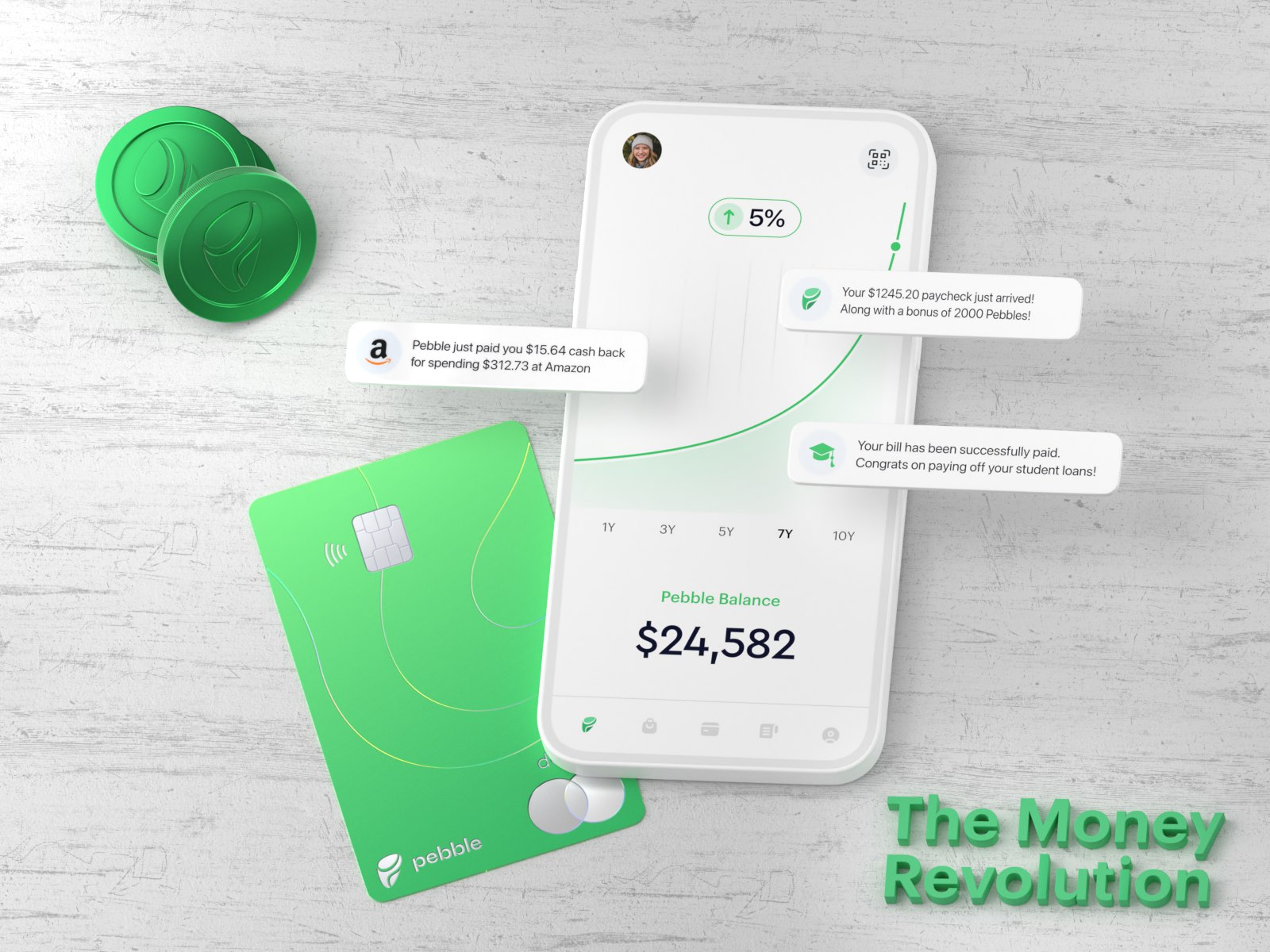As equities continue to trade down from recent peaks, investors are searching for higher returns. Some have turned to the crypto-based decentralized finance (DeFi) realm, where yields from lending and staking cryptocurrency can range from 1% to as high as 15% for riskier projects.
Others are looking at high-yield savings accounts like the one from Y Combinator-backed fintech startup Pebble, which offers 5% annual percentage yield (APY) on all cash deposits. Pebble is able to offer these relatively high yields through the use of stablecoins, which have found themselves in the spotlight recently after Terra’s UST experienced a meltdown, leading to broader instability in the crypto ecosystem.
But Pebble’s approach involves much less risk than people have come to associate with stablecoins, co-founder and CEO Aaron Bai explained to TechCrunch in an interview.
Pebble users first deposit fiat currency into their accounts, Bai said. The startup then converts that cash into USDC, a digital stablecoin backed by traditional reserves of cash and Treasuries — a notably different approach from algorithmic stablecoin UST which uses a much more complex system to maintain its peg to the U.S. dollar and holds other cryptocurrencies rather than fiat currency as reserves.
Once Pebble converts the cash into USDC, it lends the funds out to “highly regulated institutions” such as crypto companies Coinbase and BlockFi as well as traditional financial entities, including hedge funds, that are willing to pay a premium to access stablecoins because of their efficiency and ease of use, Bai said. When I asked Bai whether he’s concerned about users losing their money if institutions fail to repay the loans, Bai explained that Pebble lends out funds with 150% overcollateralization — meaning the borrowers put down assets worth 150% of the value of the loan as collateral.

“If you’re lending without collateral, there’s a huge risk, because [the borrower] is not putting down an asset,” Bai said. “Fortunately, because [Pebble’s borrowers] are putting $1,500 down, say, on a user’s $1,000 deposit, there is an asset. So even if the borrower fails to pay, we can liquidate their assets.”
Bai said Pebble partners with two lending institutions to further mitigate its risk, in addition to crypto API provider Prime Trust.
In addition to the 5% APY feature, Pebble also offers 5% cash back on all transactions with its 55 partner merchants, which include Uber, Amazon, Chipotle, Airbnb and Adidas, Bai said. But Pebble isn’t a credit card, he added. Its interface functions as one single app where the 5% interest on cash applies to all deposits made and the 5% cash back applies to all spending through the app made through these merchants, Bai said.
Pebble’s 5% cash back is higher than what traditional credit cards tend to offer because traditional credit card providers rely on middlemen like Visa and Mastercard as well as fraud protection services and other third parties to process their transactions, leaving less in reward cash for the customer, Bai explained. Pebble, in contrast, is set up like an affiliate program with each merchant, wherein Pebble serves as a customer acquisition channel for the merchant and issues rewards to its customers in the form of gift cards to that merchant rather than direct cash rewards, he said.
That system allows merchants to save up to 7% on each transaction, making it more lucrative for them to offer rewards through Pebble rather than a credit card provider, according to Bai.
“Every time a customer buys a gift card through the Pebble ecosystem, that money is going straight to the merchants. The merchants love that they’re actually getting their profits and they’re not paying out these inefficient middlemen, and they want to continue the cycle,” Bai said.
The gift cards show up on the Pebble app as either a QR code that can be scanned at each merchant in-person or as an alphanumeric code that’s redeemable online, Bai demonstrated as he walked me through the app. Notably, Pebble does work with Mastercard to offer this feature through a Pebble-branded virtual card (and physical card for certain customers), Bai said.
The company, a participant in Y Combinator’s Winter 2022 cohort, came out of stealth and announced its $6.2 million seed round today. Investors in the round include Y Combinator, LightShed Ventures, Eniac Ventures, Global Founders Capital, Montage Ventures and Soma Capital, as well as angel investors Odell Beckham Jr., musician Matthew Bellamy, Quantstamp CEO Richard Ma and others.

Bai and his co-founder/CTO Sahil Phadnis are working with their two other team members to develop other features that will help users manage their personal finances on a daily basis, they told me. Pebble already has a feature that allows users to pay, track and manage their bills by snapping pictures of them and uploading them to the app, and is further developing payroll integrations, Bai explained.
Like many fintech entrepreneurs, the co-founders are clear about their disdain for traditional banks, with their bevy of fees and often-antiquated tech interfaces. So how will Pebble differentiate itself from a bank?
Bai was less clear about this. He said customers will be able to accumulate reward points for their activity on the app, called “Pebbles,” but declined to share much detail on what those Pebbles actually enable or represent beyond that they’ll be crypto-related in some way.
“If you’re here for the crypto the Pebbles are key, and the more power you’re going to have as we advance this platform and transition to a different stage,” Bai said.
Terra’s UST crash will make life harder for crypto as regulation looms
Still, users don’t need to be crypto-savvy to use Pebble, he explained.
“We want to be that bridge, from the web2 user to web3 through a very simple, attractive financial app, where people can hold their first digital assets without even knowing about it,” Bai said.































Comment